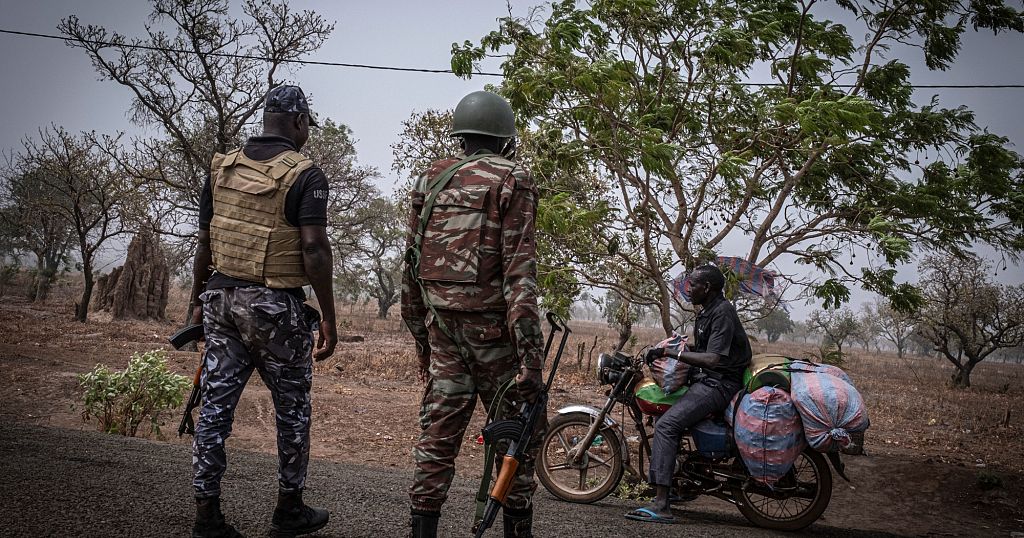Africa
Trump says U.S. and China will ‘get along great’

President Donald Trump continued to predict Wednesday the U.S. and China will reach a “fair” trade deal in the coming weeks, telling reporters in the Oval Office, “we’re going to get along great with China.”
“In the end, I think what’s going to happen is we’re going to have great deals,” Trump said in the Oval Office.
The comments from Trump come a day after he said he would not “play hardball” with China and that his tariffs would come down “substantially.”
But he reiterated that the U.S. will “set the tariffs” if China doesn’t make a deal.
China, meanwhile, took its opposition to Trump’s tariff war and America First policies to the United Nations, asking whether the world should advocate for all countries to work together or “return to the law of the jungle where the strong prey on the weak.”
The call by China’s U.N. Ambassador Fu Cong for nations to back multilateralism, the bedrock of the United Nations, got overwhelming support at an informal meeting of the U.N. Security Council Wednesday — except from the United States.
The president also told reporters in the Oval Office that he’ll meet with a number of foreign leaders when he travels to Rome for Pope Francis’ funeral later this week.
Trump said he has “a lot of meetings set up,” but he declined to name any of the leaders and dodged repeated questions about whether he would meet with Ukrainian President Volodymyr Zelenskyy while there, saying he didn’t know if he would be attending.
Zelenskyy is set to attend.
Africa
Benin says 54 soldiers killed in Islamic militant attack

An attack by Islamic militants on military posts in northern Benin last week left at least 54 soldiers dead, the West African country’s government said.
Authorities had previously said that only eight soldiers were killed on April 17.
JNIM, an extremist group linked to al-Qaida, claimed responsibility for the attack and said it killed 70 soldiers, according to the SITE Intelligence Group.
The attacks took place in Benin’s northeastern Alibori department, which borders Burkina Faso, Niger and Nigeria.
Benin has for years faced spillover violence in its north from Sahel countries like Burkina Faso and Niger in their battle against Islamic extremist groups.
The tri-border area has long been a hotbed for extremist violence, primarily concentrated around the W-Arly-Pendjari Complex. The large national park spills over into all three countries and has become a launching pad for cross-border attacks by militants.
Government spokesperson Wilfried Léandre Houngbédji on Wednesday deplored the lack of cooperation with Benin’s neighbors in the fight against extremist groups.
“The points where these attacks of April 17 took place are on the border, so you can understand that if, on the other side of the border, there was a force like ours, these attacks would not take place in this way or would not even occur,” he said.
Africa
NGOs sue Spain for ignoring illegal fishing threat to African coasts

Spain is under fire—accused of ignoring illegal fishing by its own fleet in West African waters.
Environmental groups ClientEarth and Oceana have filed a lawsuit in Madrid, claiming Spanish authorities failed to act on repeated violations near Senegal and Guinea-Bissau.
At least eight Spanish vessels reportedly switched off their tracking systems—making their movements invisible at sea.
That’s a direct breach of EU rules, which require constant monitoring to prevent illegal fishing. Despite the evidence, Spanish officials declined to investigate, saying they lacked jurisdiction outside EU waters.
The lawsuit argues that loopholes in Spanish law are helping rogue operators avoid accountability. With fish stocks dwindling, local communities face job losses, hunger, and forced migration.
Campaigners say Spain must close the gaps—or risk fuelling a growing crisis in one of the world’s most vulnerable regions.
Africa
Immunization at risk: Global health leaders urge action amid rising disease outbreaks

Immunization efforts are under growing threat as misinformation, population growth, humanitarian crises, and funding cuts jeopardize progress and leave millions of children, adolescents, and adults at risk, warn WHO, UNICEF, and Gavi during World Immunization Week, 24-30 April.
Outbreaks of vaccine-preventable diseases such as measles, meningitis, and yellow fever are rising globally, and diseases like diphtheria, which have long been held at bay or virtually disappeared in many countries, are at risk of re-emerging.
In response, the agencies are calling for urgent and sustained political attention and investment to strengthen immunization programmes and protect significant progress achieved in reducing child mortality over the past 50 years.
Measles is making an especially dangerous comeback. The number of cases has been increasing year by year since 2021, tracking the reductions in immunization coverage that occurred during and since the COVID-19 pandemic in many communities.
Measles cases reached an estimated 10.3 million in 2023, a 20 per cent increase compared to 2022.
The agencies warn that this upward trend likely continued into 2024 and 2025, as outbreaks have intensified around the world.
In the past 12 months, 138 countries have reported measles cases, with 61 experiencing large or disruptive outbreaks — the highest number observed in any 12-month period since 2019.
Meningitis cases in Africa also rose sharply in 2024, and the upward trend has continued into 2025. In the first three months of this year alone, more than 5,500 suspected cases and nearly 300 deaths were reported in 22 countries.
This follows approximately 26,000 cases and almost 1,400 deaths across 24 countries last year.
Yellow fever cases in the African region are also climbing, with 124 confirmed cases reported in 12 countries in 2024.
This comes after dramatic declines in the disease over the past decade, thanks to global vaccine stockpiles and the use of yellow fever vaccine in routine immunization programmes.
In the region of the Americas, yellow fever outbreaks have been confirmed since the beginning of this year, with a total of 131 cases in 4 countries.
These outbreaks come amidst global funding cuts.
A recent WHO rapid stock takes with 108 country offices of WHO—mostly in low- and lower-middle-income countries—shows that nearly half of those countries are facing moderate to severe disruptions to vaccination campaigns, routine immunization, and access to supplies due to reduced donor funding.
Disease surveillance, including for vaccine-preventable diseases, is also impacted in more than half of the countries surveyed.
At the same time, the number of children missing routine vaccinations has been increasing in recent years, even as countries make efforts to catch up children missed during the pandemic.
In 2023, an estimated 14.5 million children missed all of their routine vaccine doses—up from 13.9 million in 2022 and 12.9 million in 2019.
Over half of these children live in countries facing conflict, fragility, or instability, where access to basic health services is often disrupted.
Continued investment in the ‘Big Catch-Up initiative’, launched in 2023 to reach children who missed vaccines during the COVID-19 pandemic, and other routine immunization programmes will be critical.
Joint efforts by WHO, UNICEF, Gavi and partners have helped countries expand access to vaccines and strengthen immunization systems through primary health care, even in the face of mounting challenges.
Every year, vaccines save nearly 4.2 million lives against 14 diseases – with nearly half of these lives saved in the African region.
Vaccination campaigns have led to the elimination of meningitis A in Africa’s meningitis belt, while a new vaccine that protects against five strains of meningitis holds promise for broader protection, with efforts underway to expand its use for outbreak response and prevention.
Progress has also been made in reducing yellow fever cases and deaths through increasing routine immunization coverage and emergency vaccine stockpiles, but recent outbreaks in Africa and in the Region of the Americas highlight the risks in areas with no reported cases in the past, low routine vaccination coverage and gaps in preventive campaigns.
In addition, the past two years have seen substantial progress in other areas of immunization.
In the African region, which has the highest cervical cancer burden in the world, HPV vaccine coverage nearly doubled between 2020 and 2023 from 21 percent to 40 percent, reflecting a concerted global effort towards eliminating cervical cancer.
The progress in immunization also includes increases in global coverage of pneumococcal conjugate vaccines, particularly in the South-East Asia Region, alongside introductions in Chad and Somalia, countries with high disease burden.
Another milestone is the sub-national introduction of malaria vaccines in nearly 20 African countries, laying the foundation to save half a million additional lives by 2035 as more countries adopt the vaccines and scale-up accelerates as part of the tools to fight malaria.
UNICEF, WHO, and Gavi urgently call for parents, the public, and politicians to strengthen support for immunization.
The agencies emphasize the need for sustained investment in vaccines and immunization programmes and urge countries to honour their commitments to the Immunization Agenda 2030 (IA2030).
As part of integrated primary healthcare systems, vaccination can protect against diseases and connect families to other essential care, such as antenatal care, nutrition or malaria screening.
Immunization is a ‘best buy’ in health with a return on investment of $54 for every dollar invested and provides a foundation for future prosperity and health security.
Gavi’s upcoming high-level pledging summit taking place on 25 June 2025 seeks to raise at least US$ 9 billion from our donors to fund our ambitious strategy to protect 500 million children, saving at least 8 million lives from 2026–2030.
-

 Europe2 days ago
Europe2 days agoHow Pope Francis’ early life in Argentina explains his time in the Vatican
-

 Education1 day ago
Education1 day agoHarvard’s president says the school will ‘not compromise’ on its rights with the Trump admin
-

 Middle East1 day ago
Middle East1 day ago‘I don’t know where I will go’: Refugees run out of options in Tunisia | Migration News
-

 Middle East1 day ago
Middle East1 day ago‘I grabbed my cat and ran’: Istanbul panics as earthquake hits | Earthquakes News
-
Europe1 day ago
New Prince Louis photo released to mark 7th birthday
-
Europe1 day ago
How to visit Rome for Pope Francis’ funeral and conclave
-

 Lifestyle1 day ago
Lifestyle1 day agoNFL draft suits give prospects another way to cash in on their fame, flash their style on red carpet
-

 Conflict Zones1 day ago
Conflict Zones1 day agoManhunt under way in Kashmir after deadly attack on tourists | Conflict News




